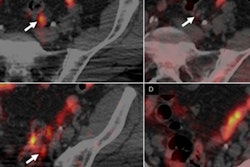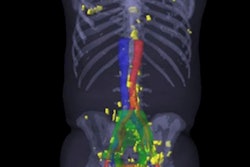
Australian researchers found that treatment plans for more than half of prostate cancer patients were changed due to the results of PET/CT scans using a radiopharmaceutical that combines gallium-68 (Ga-68) with a molecular compound that homes in on prostate-specific membrane antigen (PMSA), according to a study presented at this week's Society of Nuclear Medicine and Molecular Imaging (SNMMI) meeting.
Researchers led by Dr. Paul Roach of Royal North Shore Hospital in Sydney studied a group of 431 prostate cancer patients who were seen at four institutions between January 2015 and June 2016. In all, 25% of patients had scans performed for primary staging, while 75% of scans were conducted for rising prostate-specific antigen (PSA) levels after surgery or radiotherapy.
Patients were injected with the Ga-68 PSMA radiopharmaceutical; after results were interpreted, the referring physicians were asked whether the scans would change their management plan.
PET/CT scans with Ga-68 PSMA led to a change in management in 51% of patients, the researchers found. Patients with an indication of biochemical recurrence after surgery had a management change rate of 64%, while those who had received radiation therapy had a rate of 69%. Patients who got scans for primary staging had a change rate of 23%.
Preliminary analysis of the data showed that the scans detected previously unsuspected disease in the prostate bed in 30% of patients, disease in the locoregional lymph nodes in 36% of patients, and distant disease in 16% of patients. What's more, using Ga-68 PSMA PET/CT for primary screening of intermediate- and high-risk prostate cancer patients led to a change in management in 23% of cases.
The findings demonstrate the need for additional government funding of Ga-68 PSMA scans and for insurers to pay for the procedure, according to Roach and colleagues.




















